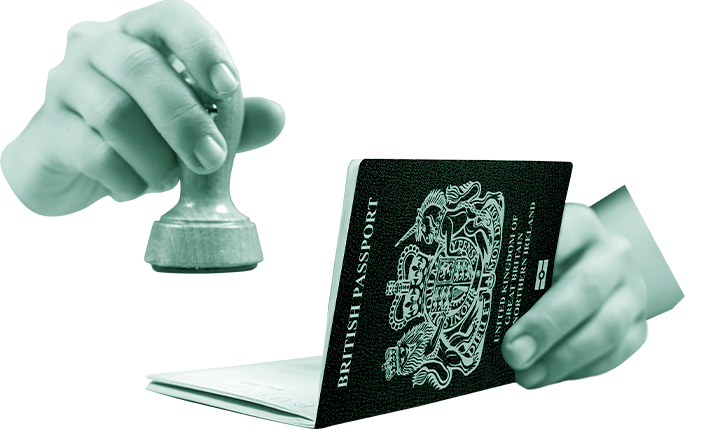Let's Talk

Need Help Urgently?
Call our 24 hour rapid response team now on 0333 311 1090
Request a callback
"*" indicates required fields


The UK Innovator Founder Visa is a great chance for eager entrepreneurs with new business ideas. This visa is part of the UK immigration system. It aims to bring skilled business people to start their businesses in the UK. This helps spark innovation and grow the economy. If you are thinking about this visa, it is vital to know the eligibility requirements well.
The UK Innovator Founder Visa has taken the place of the Tier 1 (Entrepreneur) visa and the Innovator Visa. It wants to bring in more skilled business people who plan to start a business in the UK.
To qualify for this visa, you must get a stamp of approval from a Home Office-approved endorsing body. This process requires you to show that your business idea is new, possible, and can grow. You must also show that you actively participate in the daily activities of the business.
The UK Innovator Founder Visa lets you live and work in the UK for up to three years. To qualify, you need to get an endorsement letter from an approved endorsing body. This letter shows that your business idea is creative, practical, and can grow, according to the Home Office’s rules.
The Home Office manages UK immigration. They have given certain organizations the power to approve applications for this visa. These endorsing bodies carefully check each applicant’s business plan and decide if they fit the requirements. To receive an endorsement, a business idea must be innovative, viable, and scalable.
This endorsement process helps make sure that only strong applications go through. It helps the UK attract real and promising entrepreneurs who can help the UK economy grow.

The UK wants to bring in talented people from around the world. The Innovator Founder Visa reflects this goal. It offers a way for entrepreneurs with new ideas to start their businesses in the UK. This move helps make the UK a center for creativity and growth.
This visa helps not only the entrepreneurs but also the UK economy as a whole. When these visa holders set up their businesses in the UK, they help create jobs. This, in turn, boosts economic activity and strengthens the country’s position globally.
An example of the UK’s support for innovative businesses is the Global Entrepreneurs Programme (GEP). The GEP looks for and helps promising entrepreneurs. It gives them the tools and guidance to grow their ventures. – GEP is one of the endorsing bodies.
Before you start the application process, make sure you meet the eligibility criteria. It’s important to meet these requirements for your application to be successful. So, preparation is key.
You will need to meet certain requirements based on your business idea, financial status, English language proficiency, and a few other things. Let’s examine each part in detail.
To get the UK Innovator Founder Visa, you must meet certain criteria. Your business idea must be your own or one where you played a big part in creating it. You also need to show that you plan to actively manage and grow the business.
You must prove your English language proficiency meets the standard, which is usually at least CEFR Level B2. Also, be ready to show that you can support yourself financially when you first arrive in the UK. This usually means having enough money to cover your expenses.
It’s important to know that you cannot switch from some visa types, like a visitor visa or short-term student visa, to the Innovator Founder Visa. On the other hand, if you are in the UK with a different visa, like the Skilled Worker visa, you might be able to switch.
While there’s no set minimum investment requirement for the Innovator Founder Visa, you’ll need to demonstrate access to sufficient funds for your business. This evidence can include personal savings, investments, or funding from a third party.
The exact amount required will depend on factors like your business plan and projected expenses:
| Financial Requirement | Amount |
| Maintenance (Applicant) | £1,270 |
| Maintenance (Partner) | £285 |
| Maintenance (First Child) | £315 |
| Maintenance (Each Additional Child) | £200 |
You need to hold these funds in a regulated financial institution, such as a bank account, for a specific period before applying. Having a clear understanding of these financial requirements will strengthen your application.
To work and live in the UK, you need to show that you can speak English well. The Home Office requires you to take a secure English language test (SELT) from a provider they approve.
For the Innovator Founder Visa, you usually need to reach a B2 level on the Common European Framework of Reference (CEFR) for Languages. This level shows that you can communicate effectively in English in different situations, which is important for managing a business in the UK.
But, there are some cases where you might not need to meet the English requirement. If you come from a country where English is the main language, or if you have a degree that was taught in English, you may not need to take the test. Make sure to check if you qualify for an exemption before you apply.


Securing an endorsement is one of the most important steps in getting the Innovator Founder Visa. You need to show an approved body that your business idea is innovative, viable, and can grow.
This usually means you must submit a clear business plan. You also need to show proof of your skills and experience. Lastly, you may go through interviews with the endorsing body.
Choosing the right endorsing body is very important for your application’s success. You need to research each approved body and learn about the specific endorsement criteria they look for. Some organizations focus on certain industries, like technology or healthcare, while others have general criteria.
When you check endorsing bodies, think about these factors:
Looking at these points can help you find the best endorsing body for your business idea. This will improve your chances of getting an endorsement.
A strong and clear business proposal is key for getting support for your Innovator Founder Visa application. Your proposal should detail your original business plan. This includes your business goals, target market, and expected growth.
It’s important to showcase the unique parts of your business. Show how your product or service provides a special solution, fills a market gap, or uses new technologies.
You might want to add information about your intellectual property protection strategies. This could be through patents, trademarks, or copyrights. Showing that you have thought about these details lets the endorsing body know your plan is solid.
Once you get the endorsement letter from your chosen body, you can start your Innovator Founder Visa application. The endorsement letter is very important. It proves that your business plan meets the required standards.
Next, you can send your visa application to the Home Office. You will need to submit different supporting documents. These include proof of your identity, your financial status, your English language skills, and the endorsement letter. Don’t forget that you may also need to pay the visa fees.
Keep in mind that you can begin the company registration process with Companies House after getting the endorsement. However, your business cannot start trading until you have your visa. Understand these rules well to avoid any issues with your application.
After you check that you meet the eligibility criteria, you can start the application process for the Innovator Founder Visa. Following a step-by-step plan can make this important task easier.
Here is a simple list of the key steps you need to take:
As we talked about before, getting an endorsement from a recognized body is key for the Innovator Founder Visa application. Start this process by carefully looking into different endorsing bodies and what they need for endorsements.
Next, take a close look at your business idea. Find an endorsing body that matches your industry and business model. This focused approach can help you have a better chance of getting a positive assessment.
Also, create a strong business plan that shows how unique, workable, and expandable your business idea is. Your plan should cover your business goals, market analysis, marketing strategies, and financial forecasts. This way, you can clearly demonstrate the potential of your venture.
Once you get the endorsement letter, you can start filling out the Innovator Founder Visa application form. This step needs you to provide correct and current information, along with supporting documents.
You can download the application form from the Home Office website. The form will ask for details about your background, your business, and your plans in the UK.
Make sure to look over the guidelines carefully and include all needed information. Mistakes or missing information in the application can cause delays or even lead to a rejection. So, be careful and thorough during this part of the process.
Getting your documents ready for your application is very important. These papers help prove what you say and show you meet the eligibility requirements.
You will need to include documents like your passport, endorsement letter, financial proof, and an English language proficiency certificate (if needed).
Check the list of required documents on the Home Office website. Make sure all your documents are current and translated into English if they are in another language.
Paying the visa application fee is an important step in the process. The fee can change based on your nationality and the visa type you are applying for. You can check the latest fee details on the Home Office website.
Besides the visa fee, you must also pay the Immigration Health Surcharge (IHS) for your application. The IHS allows you to use the UK’s National Health Service (NHS) while you stay.
It’s a good idea to keep all of your payment confirmations. You might need these documents later in the application process.
After you submit your application and documents, you may be asked to attend a visa interview. This interview is where a representative from the Home Office checks if you are eligible for the Innovator Founder Visa.
During the interview, be ready to talk about your background, business idea, and plans in the UK. The interviewer may ask you to explain parts of your application or give more details about your case.
It’s important to stay calm, collected, and confident during the interview. Clearly express your answers. Show your passion for your business and your commitment to the UK.
Applying for the Innovator Founder Visa might look easy, but every step needs careful attention. If you pay close attention to important details during the application process, you can greatly improve your chances of success.

Understanding how long it takes to process a UK Innovator Founder Visa application is important. The processing time can change based on things like how many applications there are and how complex each case is. Knowing a general timeframe can help you plan better.
The Home Office tries to finish most visa applications within a certain timeframe. If you apply from outside the UK, you should expect a decision within three weeks from the date of application. If you are applying from inside the UK, it could take up to eight weeks to get a decision. Expedited services may be available for faster processing, subject to an additional fee.
Keep in mind that unexpected events, like global situations or changes in immigration rules, might cause delays in processing.
While the Home Office wants to handle applications quickly, sometimes your visa application may face delays. These delays can happen for several reasons. It might be due to missing information, lack of documents, or the need for more checks.
Sometimes, the Home Office may reach out to you with something called a “Request for Additional Information” (RFI). This means you need to give more documents or explain parts of your application. It’s important to respond to an RFI quickly and correctly to avoid more delays.
During the application process, it is helpful to check your application status online regularly. Make sure your contact details are accurate. Being active and quick to respond to any messages from the Home Office can help make your application process smoother.
While following the application process and meeting all requirements can help, your visa application might still get denied. A visa application can be refused for different reasons. These include not meeting the eligibility criteria, not providing enough evidence, or concerns raised during the interview.
If your application is denied, stay calm. There might be options to appeal the decision, depending on why it was refused. You can ask for an administrative review or file an appeal in some cases.
It is a good idea to get advice from an immigration lawyer if your application is turned down. They can look at the refusal notice and guide you on your options. They can also help you prepare a strong case for an appeal or review.
One big benefit of the UK Innovator Founder Visa is that you can become a permanent resident after setting up and running your business well. This is called “Indefinite Leave to Remain” (ILR). It lets you live and work in the UK without limits.
But, to get ILR, you must meet some requirements. You need to show that you have lived in the UK continuously. You also need to meet financial rules and prove how your business helps the UK economy.

To get Indefinite Leave to Remain (ILR) under the UK Innovator Founder Visa scheme, you must follow certain rules. First, you need to prove you started a successful business in the UK. This should be based on your original business plan. You also need to show that your business makes a significant contribution to the economy. This can be through job creation or other ways.
You must meet the English language proficiency requirement. It’s also important to have the required investment funds in a UK bank account. Your business activities should relate to your innovative business concept. They should also show scalability and a competitive advantage. Getting ILR means you play an important role in the UK business scene.
Applying for ILR is an important step in your UK immigration journey. Before you apply, make sure you are ready and meet all eligibility requirements. This means gathering the needed documents, checking your immigration history, and knowing the application process.
One key requirement is continuous residence. You need to show that you have lived in the UK without major gaps for the required time, which is usually five three years as an Innovator Founder. This may require you to give detailed travel records.
You also must prove your English language proficiency once more. This can mean taking an approved English language test or showing proof that you are exempt from the test.

The time between having the Innovator Founder Visa and applying for ILR is very important. You need to pay attention to details during this time. It’s vital to keep meeting the requirements for ILR and avoid anything that could harm your application.
Keep working on and growing your business. Show how it adds to the UK’s economy. You might need to meet with your endorsing body, share regular updates about your business, and follow any reporting needs.
Also, stay informed about any changes in immigration rules or policies during this period. Check the Home Office website or ask an immigration lawyer for guidance.

Holding a UK Innovator Founder Visa gives you certain rights. It also comes with some responsibilities that you need to follow while you are in the UK.
Let’s go over these rights and responsibilities.
One of the main benefits of this visa is that it lets you work in the UK. You can focus on your sponsored business activities. This right helps you use your time to make your business grow. While your visa is mainly for developing your venture, it’s good to know if it allows you to take on other jobs.
The Innovator Founder Visa usually does not permit work outside of your approved business activities. This rule makes sure you stay focused on building your business to help the UK economy, as the visa is meant to do.
It’s always a good idea to talk to an immigration lawyer. You can also check your visa terms to understand any specific rules based on your situation.
Holding a UK Innovator Founder Visa allows you to use many public services and benefits while you are here. The UK offers various public services to support residents, including healthcare and education, which are necessary for daily life.
You need to pay the healthcare surcharge (IHS) when you apply for your visa. By doing this, you have the right to receive healthcare through the NHS. This access is important for your health and peace of mind during your time in the UK.
It is important to know your rights and responsibilities. This way, you can make the most of your stay in the UK.
As an Innovator Founder Visa holder, you have some travel rights. These rights let you travel in and out of the UK during your visa’s valid time.
But, there are conditions you need to follow. These conditions often depend on how long you can stay outside the UK and how it may affect your future ILR application.
It’s very important to note that having an Innovator Founder Visa does not mean you can come back to the UK automatically. Border control officers can ask you to show proof of your business activities, why you plan to leave the UK when your visa ends, and if you follow all the visa rules.
One great thing about the UK Innovator Founder Visa is that it lets you bring your family. You can bring your spouse or partner and dependent children with you to the UK. This allows you to start a new life together as you chase your business goals.
To bring your family to the UK, you have to show proof of your relationship. You must also meet certain money needs. Plus, all family members need to follow the eligibility criteria for the dependent visa.
When you apply for the UK Innovator Founder Visa, you can add your eligible family members to your application. This often includes your spouse or partner and any children under 18 that you take care of.
To apply for dependent visas, you must show proof of your relationship. This could be a marriage certificate or proof that you live together. You also need to show that you can support your family while living in the UK.
The application process for dependent visas is usually simple if you submit it with the main Innovator Founder Visa application. Still, it is a good idea to talk to an immigration lawyer for help. They can make sure you meet the requirements.

Relocating to a new country with your family means making many changes. Getting to know the local culture and lifestyle can help your family fit into UK society easily.
The UK is a mixed nation that welcomes people from all backgrounds. However, learning about British customs, traditions, and social rules can make your move easier.
It can be helpful to encourage your family members to join local events, sign up for clubs, or take language classes. This can help them make friends and feel more at home. Taking these chances to integrate will lead to a better and more enjoyable experience for your family.
To keep your Innovator Founder Visa valid in the UK, it’s important to know when and how to renew it. You need to show that your business is still improving and follow the rules set by your first visa.
If you understand what is needed for renewal and send a complete application, it can help you have an easy renewal experience.

The UK Innovator Founder Visa usually lasts for three years at first. As you near the end of this time, it’s important to know how to renew your visa. This will help you keep living and working in the UK legally.
You need to plan when to apply for your extension. You can start your application before your current visa runs out. Doing this early is important so you account for any delays in processing.
To renew your visa successfully, you must meet certain criteria set by the Home Office. This often means showing that you made real progress in your business. Examples include hitting growth targets, getting funding, or creating jobs.
To renew your Innovator Founder Visa, you must submit a new application that includes updated details about your business and personal situation. You will also need to include supporting documents that prove you still qualify for the visa.
These documents often include:
The UK’s exit from the European Union, known as Brexit, has changed its immigration rules a lot. The new rules are set up to create a points-based immigration system. This system will treat both EU and non-EU citizens the same when they apply for UK visas.
Even with these changes, the UK still wants to attract talented people from all over and support new ideas. The UK Innovator Founder Visa is a helpful option for entrepreneurs and innovators around the world. This visa helps them start and grow their businesses in the UK.
Following Brexit, the UK made new immigration rules. These rules affect how people, including EU citizens, can live and work in the UK. A big change is a points-based system for all nationalities. This system gives points based on skills, qualifications, and salary to decide if someone can get certain visas.
The Innovator Founder Visa is not part of the points-based system, but it has changed a bit because of the new immigration rules. Now, all applicants must show their English language skills and meet the same financial requirements, no matter where they are from.
Even with these changes, the UK still wants to bring in talented entrepreneurs. The government knows that global talent is important for the UK’s economy. They have kept the Innovator Founder Visa as a main option for entrepreneurs from around the world.
Brexit has brought some new challenges for businesses. But it has also opened up chances for innovative companies wanting to make a mark in the UK. As the UK looks to change its economy, there’s a big focus on innovation and entrepreneurship to help future growth.
The UK government wants to attract businesses that work in areas like technology, life sciences, and renewable energy. These sectors fit well with the country’s long-term economic goals. If your innovative business is in these fields, you might find a welcoming and supportive atmosphere in the UK.
Moreover, the UK is now paying more attention to global trade and building partnerships. Businesses in the UK with innovative products or services may have new chances to grow their reach internationally.
The UK Innovator Founder Visa has helped many entrepreneurs make their business dreams come true. These success stories show the variety of businesses set up in the UK. They inspire new business owners to follow their passion.
These stories prove that the UK is a great place for starting a business and being creative. They also highlight the chances available for those who want to take this journey.
A young entrepreneur from India loved sustainable living. She had a special business idea and moved to the UK using the Innovator Founder Visa. She created a new, eco-friendly packaging from agricultural waste.
After just one year in the UK, she got funding, launched her product, and received praise for her work in sustainability. Her business is growing and now has more employees. It is also catching the attention of investors and retailers all over the UK.
This story shows how the UK’s support for startups can help determined and hardworking people achieve great things.


For many entrepreneurs, getting a UK Innovator Founder Visa can be tough. A software developer from Nigeria always wanted to start his tech business in the UK.
His first visa application was turned down because there were doubts about his business idea. But he did not give up. He improved his business plan, got advice from experienced entrepreneurs, and fixed the issues from his first application.
His hard work paid off. His second application was approved. Now, his software company is growing and attracting clients from different industries. It is helping the UK technology sector grow as well. His story shows that being persistent and adaptable is important when going through the visa application process and when building a successful business in the UK.
In summary, the UK Innovator Founder Visa helps entrepreneurs and innovators set up in the UK. It’s important to know the eligibility criteria, endorsement process, and application steps for a successful visa journey. The visa application process requires careful attention and good preparation. The changes from Brexit on immigration rules also need to be considered by visa holders. By staying informed and getting professional help when necessary, applicants can improve their chances of getting and renewing the Innovator Visa. For more help and personalized advice, reach out to us. Good luck with your entrepreneurial efforts in the UK!
What makes a strong endorsing body application?
A strong application for an endorsing body shows a real and innovative business that can grow. To get a good endorsement, you need a clear business plan, evidence of your experience, and a fit with what the endorsing body is looking for.
Can I switch from another visa type to the Innovator Founder Visa?
Switching to the Innovator Founder Visa depends on the visa you currently hold and if you meet the eligibility requirements. There are specific immigration rules to follow. Some types of visas may not let you switch directly.
What are the major reasons for Innovator Visa application refusal?
Not being able to meet the eligibility criteria can cause problems. If you don’t have support from an approved body, that can hurt your chances too. A weak business plan or unclear proof of innovation might also lead to a refusal of your Innovator Visa application.
How does the Innovator Visa differ from the Start-up Visa?
The Innovator Visa is meant for experienced business owners. In contrast, the Start-up Visa is for new entrepreneurs. Unlike the Start-up Visa, the Innovator Visa does not require an investment.
Is there a minimum investment requirement for the Innovator Founder Visa?
The Innovator Founder Visa does not require a specific minimum investment. However, you must show that you have enough money to take care of yourself and your business.
We are always happy to talk about any legal concern you may have regarding criminal law matters.
Get In TouchWhen dealing with complicated legal issues or problems with the UK Innovator Founder Visa application, it’s a good idea to get legal help quickly. Legal experts can give you advice that fits your needs. They can help you follow the rules and improve your chances of success in the application process.


Choosing an immigration lawyer or consultant is very important for a successful UK Innovator Founder Visa application. You should look for someone who knows UK immigration law well. Check their history of successful visa applications and how well they communicate. They need to understand your business and help you on your journey as an entrepreneur.



Call our 24 hour rapid response team now on 0333 311 1090
"*" indicates required fields
"*" indicates required fields